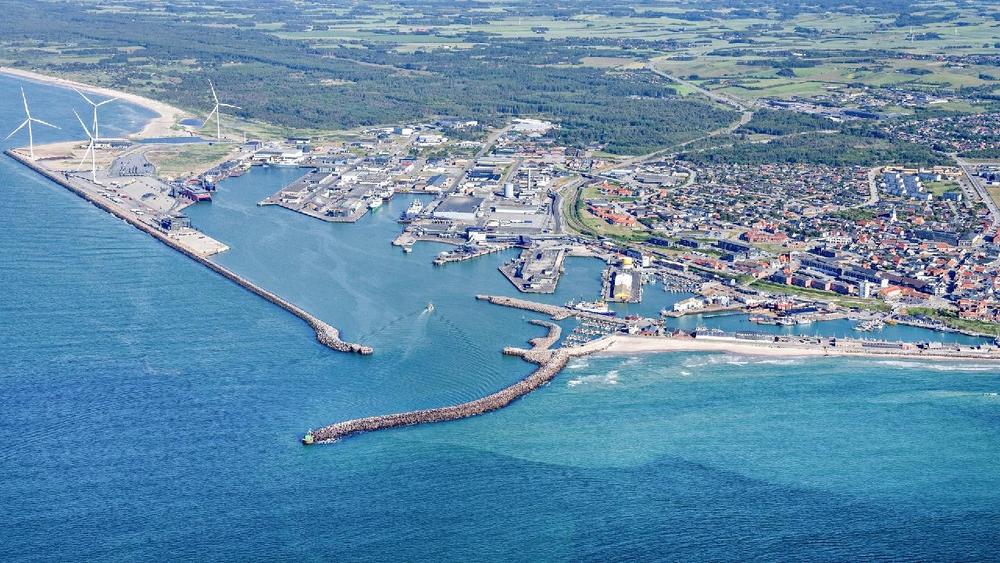- Greenport Scandinavia would be Northern Europe’s largest CO2 hub with handling capacities of around 15 million tonnes
- Emissions from Germany are to be handled here from 2027
- "Just Transition Fund" supports projects to reduce CO2 emissions and achieve climate targets
Greenport Scandinavia, a CO2 hub in development at the Port of Hirtshals in Denmark, has been granted EUR 14.6 million (DKK 109 million) funding from the European Commission’s "Just Transition Fund". The project aims to establish a hub to collect CO2 from industry in Denmark and other European countries, and ship it offshore for safe and permanent storage in the reservoirs in the North Sea. The funding will support the project and development of extensive value chains for CO2 capture, usage, and storage (CCUS) in Europe.
Greenport Scandinavia is one of the most ambitious CCUS projects in Northern Europe and the only Danish project proposed for EU funding under the 2023 "Just Transition Fund" call. It is being developed by a consortium consisting of INEOS Energy, Wintershall Dea, Evida, Port of Hirtshals, and other Danish partners.
Greenport Scandinavia is an important part of Wintershall Dea’s growing carbon management & hydrogen portfolio. The company is currently developing a growing network of CCS projects in Northern Europe, including the Greensand CCS project in Denmark, where together with INEOS Wintershall Dea successfully demonstrated the first full cross-border CCS value chain in Europe in March 2023. Greensand is also planned to be a location for storage of carbon dioxide transported from the Greenport Scandinavia CO2 hub.
"Denmark is making the progress developing the CCS value chain that we urgently need to decarbonise Europe. As part of the Greenport Scandinavia consortium, Wintershall Dea is contributing three decades of extensive infrastructure expertise. We welcome this funding, which recognises the importance of the project and will help turn it into reality," said Mario Mehren, CEO of Wintershall Dea. "To ensure that emissions from Germany can be processed at Hirtshals from 2027, we need a legal framework for cross-border CO2 transport in Germany as soon as possible," he added.
The project aims to establish annual shipments of up to 500,000 tonnes of CO2 from biogas plants in Northern Jutland starting from 2025/2026. From 2029, with the development of an initial Danish CO2-pipeline infrastructure, the handling volume at the hub is expected to increase to around three million tonnes of CO2 per year. Annual capacity would rise further to around 15 million tonnes when the hub is able to receive CO2 from all of Northern Europe in the early 2030s.
Greenport Scandinavia was launched in December 2022 with the aim of supporting the European Commission’s 55 per cent greenhouse gas emissions reduction target for 2030 and its 2050 climate neutrality target. The "Just Transition Fund" grant will make a significant contribution to the development of the CO2 hub.
Greenport Scandinavia and Greensand will be two important foundation stones for CO2 transport and storage in the Northern Europe. Experience gained here will go hand in hand with the development of a CO2 hub at Wilhelmshaven on the German North Sea coast. There, Wintershall Dea and other partners are developing CO2nnectNow, a planned collection and transport point for up to ten million tonnes of CO2 per year. With its carbon capture and storage (CCS) and low-carbon hydrogen projects, Wintershall Dea aims to abate annually up to 30 million tonnes of CO2 by 2040.
Wintershall Dea is transforming from the leading European independent gas and oil company to become a leading European independent gas and carbon management company. We have more than 120 years of experience as an operator and project partner along the entire E&P value chain. The company with German roots and headquarters in Kassel and Hamburg explores for and produces gas and oil in 11 countries worldwide in an efficient and responsible manner. With activities in Europe, Latin America and the MENA region (Middle East & North Africa), Wintershall Dea has a global upstream portfolio and, with its participation in natural gas transport, is also active in the midstream business. And we develop carbon management and low carbon hydrogen projects to contribute to climate goals and secure energy supplies. More in our Annual Report.
As a European gas and oil company, we support the EU’s 2050 carbon neutrality target. As our contribution we have set ourselves ambitious targets: We want to be net zero across our entire upstream operations – both operated and non-operated – by 2030. This includes Scope 1 (direct) and Scope 2 (indirect) greenhouse gas emissions on an equity share basis. Wintershall Dea will also bring its methane emissions intensity below 0.1 per cent by 2025. We endorsed the World Bank’s Initiative ‘Zero Routine Flaring by 2030’ and continue to support the initiative aimed at eliminating routine flaring in operated assets by 2030. In addition, we plan to support global decarbonisation efforts by building up a carbon management and hydrogen business to potentially abate 20-30 million tonnes of CO2 per annum by 2040. You can find more about this in our Sustainability Report.
Wintershall Dea was formed from the merger of Wintershall Holding GmbH and DEA Deutsche Erdoel AG, in 2019. Today, the company employs more than 2,000 people worldwide from almost 60 nations.
Wintershall Dea AG
Friedrich-Ebert-Straße 160
34119 Kassel
Telefon: +49 (561) 301-0
Telefax: +49 (40) 6375-3162
http://wintershalldea.com
Spokesperson Carbon Management & Hydrogen
Telefon: +49 (561) 301-3301
E-Mail: press​@wintershalldea.c
![]()

